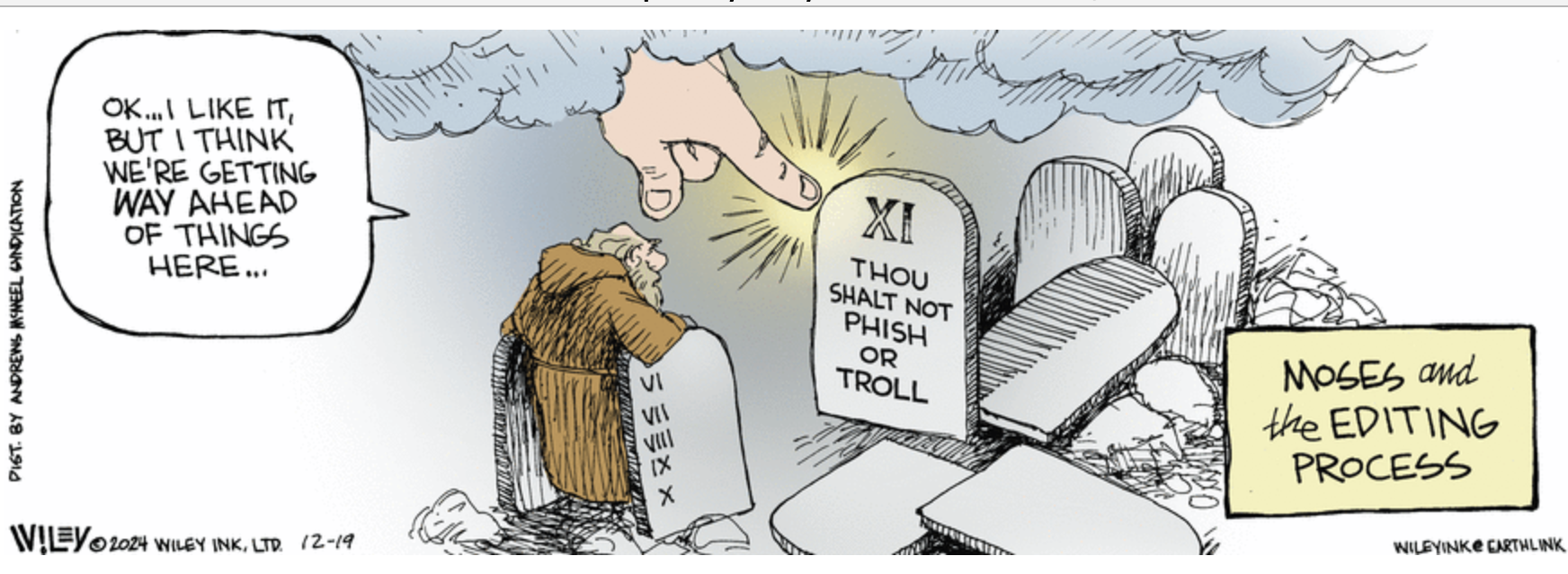Moses editing
« previous post | next post »
A prohibition against phishing would be covered by a small extension of the commandments against stealing, false witness, and coveting — probably it already is, even if the word is new.
And even a few thousand years ago, there was a version of "trolling", namely crafting verbal (or symbolic) communications with the goal of stirring up your audience and provoking unproductive controversy. Such actions, though obviously bad, are not clearly forbidden by the standard list of commandments in Exodus 20 or Deuteronomy 5, as far as I can tell. So maybe Moses should have left it in, despite the lack of a convenient word for the concept.

Matt McIrvin said,
December 22, 2024 @ 10:13 am
Bearing false witness is an accurate description for a lot of what we see around the Internet today.
natalia said,
December 22, 2024 @ 10:18 am
Proverbs 26:18-19: "Like a madman who throws firebrands, arrows, and death, is the man who deceives his neighbor and says, 'I am only joking!'"
Robot Therapist said,
December 22, 2024 @ 10:19 am
And if I recall correctly, both "phishing" and "trolling" derive from words for fishing. "Trolling" is unrelated to the creature that lives under bridges.
Mark Liberman said,
December 22, 2024 @ 11:12 am
@natalia:
Proverbs 26:18-19 is perfect — thanks!
Actually all of Proverbs 26 is relevant, since it also counsels us not to feed the trolls.
Gregory Kusnick said,
December 22, 2024 @ 11:17 am
"Trolling" may not be etymologically derived from the creature that lives under bridges, but clearly the two concepts are linked linguistically in such phrases as "Don't feed the trolls."
Philip Taylor said,
December 22, 2024 @ 12:10 pm
Or for those who had, until now, believed that the phrase "I am only joking" is unattested in the Christian Bible :
Sergey said,
December 22, 2024 @ 1:15 pm
I would define trolling differently, adding "communications that go contrary to your beliefs and knowledge". I.e. when people say something that they know to be false in their own belief and knowledge system with the goal of riling the other people. As opposed to saying something true that shows the ridiculousness of your opponents' statements – that has been an absolutely valid rhetorical device in the debates for all the human history.
Which means that the trolling under this definition would fall under "do not bear false witness".
Peter Taylor said,
December 22, 2024 @ 2:28 pm
The injunction isn't "You shall not lie" but "You shall not perjure yourself". I'm not defending lying, but "witness" here refers to judicial testimony.
C B said,
December 22, 2024 @ 5:34 pm
Such actions, though obviously bad, are not clearly forbidden by the standard list of commandments in Exodus 20 or Deuteronomy 5, as far as I can tell.
Even if you don't consider then banned under bearing false witness, they're still blatantly a violation of the prohibition against evil speech given in Psalm 34:14.
David Marjanović said,
December 23, 2024 @ 5:20 pm
No; the most effective trolls are those who don't care whether what they say is true, only whether it annoys people.
Andrew Usher said,
December 24, 2024 @ 12:37 pm
Philip Taylor, the first quotation of Proverbs 26:18 was the exact words of the RSV (which did not try to be markedly colloquial). The words 'I am only joking' are simply the closest possible equivalent in the English understood today. The English of the KJV is simply awful to read aloud today, and in that passage 'am not I' would have to be read as 'am I not' (which would not escape notice); probably it was originally read as "amn't I" (or nearly) but that's no longer an option for most of us.
Peter Taylor:
Even more, I'd say that commandment condemns lying in court only when it is done with intent to injure ' There are quite a few philosophical problems with the idea that lying (even under oath) is always wrong.
I also agree than untruth is not at all a necessary component of trolling, and it's possible the proposer was himself tolling by claiming that. I can remember some pretty obnoxious trolls whose main point was something I knew to be true, as did the troll – it's all in the way it's done.
k_over_hbarc at yahoo.com
Philip Taylor said,
December 27, 2024 @ 1:55 pm
"The English of the KJV is simply awful to read aloud today" — with respect, I beg to differ. The English of the KJV has majesty, and the attempts to make it "accessible" I am afraid I regard as nothing more than dumbing down. We had the RSV when I was at school (1952–1963), and I would agree that its language is more accessible to school children than that of the KJV, but for educated adults there is nothing better (IMHO) than the KJV. The 1611 text, with its long esses, is perhaps OTT, but while the RSV is certainly better than nothing, the KJV reigns supreme for this reader.
Andrew Usher said,
December 27, 2024 @ 7:55 pm
This is a matter of taste, in my opinion. I can see how someone that exclusively learned the KJV when growing up could have such beliefs; associations that naturally grow up around the text of the Bible become attached to the particular language they are expressed in. That day, though, is coming to an end. It is not a matter of great importance for me, but I do not think either version can or should be considered wrong.